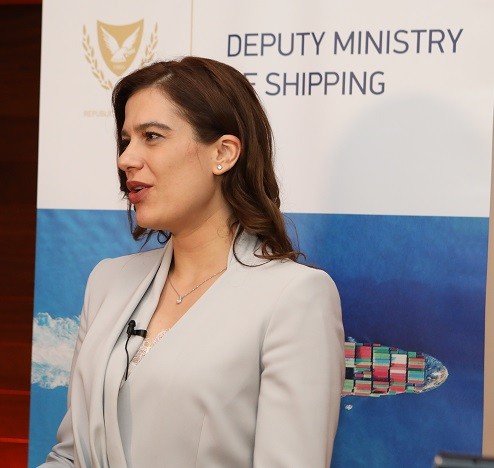Cyprus’ deputy shipping minister, Natasa Pilides, has urged governments around the globe to adapt and adopt the International Chamber of Shipping’s (ICS) protocol that allows countries to safely effect crew changes.
According to some estimates up to 200,000 crew have been be prevented from ending contracts as nation states, looking to stall the spread of Covid-19 virus, have shut out seafarers, blocking them from disembarking from vessels, even after their contracts have ended.
“We’ve had a very positive experience, all the seafarers and their companies have proved to be very professional and careful, we’ve had no difficulties in implementing the rules,” Pilides told Container News, in an exclusive interview.
Cyprus is showing the way forward for other countries. It adapted the ICS protocol, which “was very useful” to the island’s needs, now the system has been operating since the 4 May. Pilides said the International Maritime Organization (IMO) recognised that seafarers were key workers from the outset and Cyprus was in a position to help seafarers.
Pilides conceded that Cyprus was able to efficiently implement the ICS Covid-19 protocol partly because it is a small island country, and it had controlled the spread of the virus early on, “We now only get one or two infections, coming from those arriving by plane,” admitted the deputy minister.
Those infections are easily controlled with testing at the airport and isolation for travellers, but it can be problematic for other countries with different profiles, with more travellers, they would need to create systems, both medical and logistics systems, that work for their own situation, but the ICS protocol was a helpful starting position. Pilides added, “It is difficult to gauge other countries’ situation”.
Cypriot authorities, as advised by local scientists, created a system which categorised countries depending on the infection threat level for those arriving. Category A and B countries were low and medium level threats, they are mainly regional neighbours and include Austria, Australia, South Korea, Croatia, Hungary and Iceland in the low risk category A band. Medium risk states included France, The Netherlands, Belgium, Lebanon and the UAE. Although this is not the full list.
All other countries, including those not yet categorised, of which there are many, are considered category C, high risk countries.
However, for crew changes the country of origin was irrelevant, said Pilides, as the crew are essential personnel, initially crew needed permission to travel from the Cypriot authorities. More recently the Cypriot government created an app called the CyprusFlightPass, which gives crew and other authorities “accreditation and assurance that the individual has permission from the Cyprus Government to travel.”
The approvals for the entire crew given by companies, are made before the CyprusFlightPass forms are completed. CyprusFlightPass forms must be completed by each crew member separately, as they include a responsible statement and personal data, explained Pilides.
Once the status of the crew as infection free has been established the Cypriot authorities, prior to 9 June, identified a route home, giving the essential permissions to crew members.
“It was difficult before 9 June because the government had to act as the responsible body and the travel agent, but after 9 June, when commercial flights began, things became a lot easier,” admitted the deputy minister.
She added, “We haven’t had any instances of the system going wrong, and the seafarers and their companies have behaved very responsibly, if it does go wrong you just need to deal with it responsibly.”
Pilides said Cyprus was initially very surprised at the interest generated by its crew repatriation system and at first there were not many flight options for crew, with Cyprus having no direct flights to the Philippines, for example.
“We discussed our system with the secretary general [of the IMO, Kitack Lim] and he was very encouraging, sending us a letter complimenting Cyprus on its system,” said the deputy minister. “It is a burning issue that countries must look at, and it can be done,” concluded Pilides.
Nick Savvides
Managing Editor







